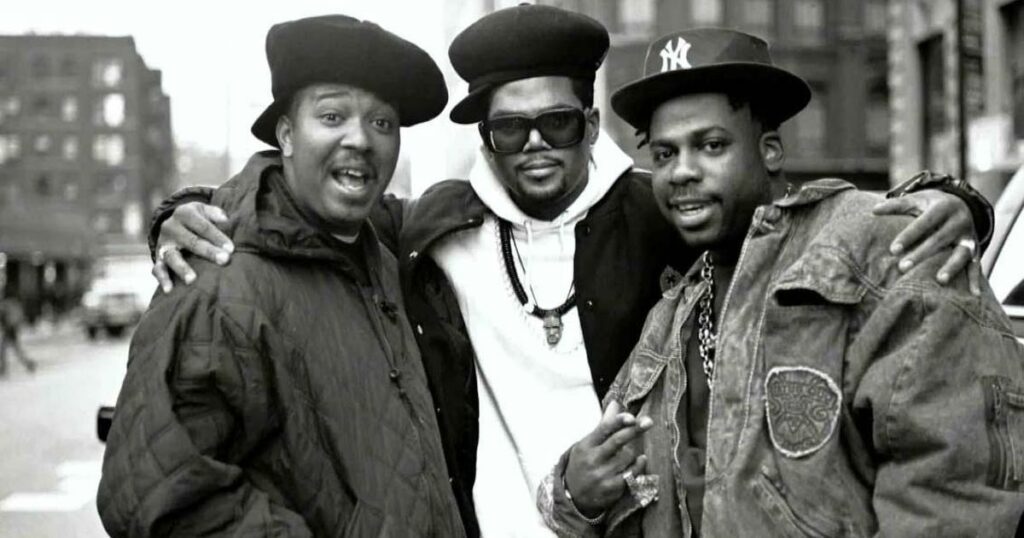80s: Emergence of Hip Hop
Hip hop emerged in the 1980s as a vibrant new cultural movement in African American and Latino communities in New York City. The genre evolved from the block parties of the South Bronx, where DJs would play funk and soul music, and MCs would rap over the beats to hype up the crowd. Hip hop culture encompassed music, dance, fashion, and graffiti art, and it provided a voice for urban youth to express themselves and their experiences. The first commercially successful hip hop singles, such as “Rapper’s Delight” by the Sugarhill Gang and “The Breaks” by Kurtis Blow, were released in the late 1970s and early 1980s and helped to popularize the genre beyond the streets of New York. As the 1980s progressed, hip hop continued to grow and diversify, with new artists and sub-genres emerging, setting the stage for the global cultural phenomenon it has become today.
Hip hop’s influence on the music industry in the 1980s was undeniable, with artists such as Run-DMC, LL Cool J, and Public Enemy achieving mainstream success and breaking down barriers for other hip hop artists. The genre’s unique sampling techniques and use of drum machines and other electronic instruments also pushed the boundaries of what was considered music and paved the way for new forms of electronic dance music.
Hip hop’s impact on the music industry went beyond just music. It also influenced fashion, language, and cultural attitudes, with artists like the Beastie Boys and N.W.A. challenging societal norms and pushing for greater social justice and equality.
The Influence of 90s Hip Hop Artists
The 1990s saw hip hop music evolve into a mainstream cultural force that had a profound impact on African American communities. At the forefront of this movement were two iconic rappers, Tupac Shakur and The Notorious B.I.G. (Biggie), who both became huge influencers in the genre.
Tupac’s music was deeply personal and often addressed issues of poverty, police brutality, and social injustice. He used his platform to raise awareness of these issues and was seen as a voice for the voiceless in the African American community. His album “All Eyez on Me” is considered a classic and is still widely celebrated today.
Biggie’s music was equally impactful, showcasing his lyrical prowess and unique flow. His debut album “Ready to Die” explored themes of life in the inner city, crime, and relationships, and it became a commercial success. Biggie was also known for his collaborations with other artists and for helping to popularize the “East Coast” style of hip hop.
Both Tupac and Biggie’s music reflected the experiences of African Americans living in urban areas, and their impact on the genre cannot be overstated. Their music provided a voice for a generation, and it helped to bring attention to the social and economic challenges faced by African Americans.
In addition to Tupac and Biggie, there were many other influential hip hop artists in the 1990s, such as Nas, Jay-Z, and Wu-Tang Clan, who also contributed to the growth and development of the genre. Overall, the 90s hip hop movement was a powerful cultural force that provided a voice for the African American community and helped to shape popular culture in America and beyond.
2000s Hip Hop With Women Influence
The 2000s saw hip hop continue to evolve and expand, with a new generation of artists emerging on the scene. One notable development was the rise of female hip hop artists, who challenged the male-dominated nature of the genre and helped to shift the conversation around women in hip hop. One of the most prominent female hip hop artists of the 2000s was Missy Elliott, whose innovative and genre-bending music and visuals captivated audiences. Her groundbreaking videos and performances showcased her creativity and fearlessness, and her music tackled themes of empowerment and self-love. Other female hip hop artists of the 2000s included Lil’ Kim, who had already achieved success in the 90s but continued to be a force in the genre, as well as newcomers like Trina, Eve, and Nicki Minaj.
These artists helped to expand the representation of women in hip hop and challenge the stereotypes and limitations that had been placed on them in the past. In addition to female artists, the 2000s saw the continued dominance of black artists in hip hop, with names like Jay-Z, Nas, and Kanye West achieving commercial and critical success. These artists explored themes of race, identity, and social justice in their music, and helped to shape the sound and direction of hip hop in the decade. Overall, the 2000s were a significant time for hip hop music and its representation of black artists, especially women. These artists helped to push the genre forward and challenge the status quo, paving the way for future generations of hip hop artists.


